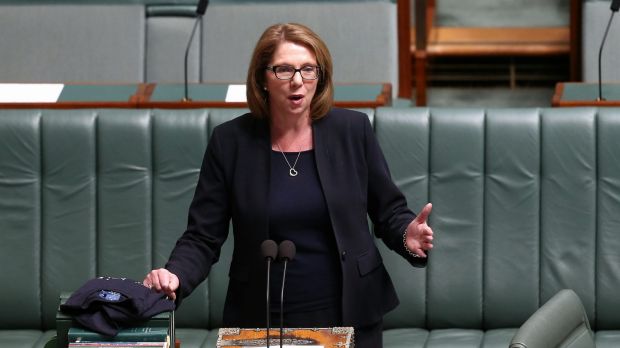
Labor’s health spokeswoman Catherine King. Photo: Alex Ellinghausen
The Abbott government could raid its Medical Research Future Fund to pay for election promises and “pet projects” under proposals before Federal Parliament, Labor says.
When it was originally announced in May 2014, budget documents said the earnings from the fund, which are expected to reach $1 billion a year by 2020, would be directed to medical research, “primarily by boosting funding for the National Health and Medical Research Council”.
But when legislation to set up the fund was introduced to Parliament last week, it did not give the NHMRC any role in deciding which projects would be funded. The legislation gives the finance minister, the Treasurer and the health minister discretion over how the funds are used.
Speaking on the bill in Parliament on Thursday, Labor’s health spokeswoman Catherine King said it could create “another government slush fund”.
“Frankly, the way that the government has established it leaves no assurance that funds will not simply be channelled to fund the Coalition’s own election commitments and pet projects, so long as they meet very broad purposes as stated in the bill,” Ms King said.
“If where the money goes is subject purely to the government’s decision making, we are absolutely trashing the reputation of Australia’s health and medical research,” she said.
Health Minister Sussan Ley said the government would appoint an advisory board to guide its decisions on disbursements from the fund, and the NHMRC would be represented on this board.
The legislation makes no reference to the advisory board, but Ms Ley said further details would be announced soon.
She dismissed Ms King’s comments as “nothing but grandstanding from a desperate opposition”.
“The Medical Research Future Fund is being set up to deliver national projects and priorities and it will naturally work hand in hand with the NHMRC and other areas of government to deliver that,” she said.
The debate follows recent public comments by former NHMRC chief executive Warwick Anderson in which he warned that vested interests were circling the fund “like sharks” and urged the research community to hold the government to its original plan for the NHMRC to decide which projects were funded.
It also follows controversy over a move by Arts Minister George Brandis? to divert almost $105 million from the budget of the Australia Council to a new program to be run by his ministry.
Australian Medical Association president Brian Owler said decisions about which research projects would be funded needed to be made “at arm’s length from the minister”.
“We want to make sure that those funds are going to go to where they’re most needed and where they’re most likely to be successful, and the best people to judge that are those that have done research and actually understand research,” Associate Professor Owler said.
Doug Hilton, the president of the Association of Australian Medical Research Institutes, said he understood the need to draft the legislation in a manner which provided maximum flexibility in spending the funds, but said he would welcome greater clarity on how these decisions would be made.
“My overarching concern would be the Medical Research Future Fund is used in the national interest, and it’s not hijacked by anybody, not hijacked by this government or future governments to pork barrel, it’s not hijacked by special interest groups, it’s not hijacked by state governments wanting to backfill funding for clinical care.”
Professor Hilton said keeping the fund separate from the NHMRC might reduce the risk of a future government cutting ordinary funding to the NHMRC as earnings from the fund grew.
Graeme Samuel, the president of Alzheimer’s Australia and a member of the Medical Research Future Fund Action Group, said he could not see how the fund could be politicised.
“I think there are a lot of easier ways to pork barrel or achieve political advantage,” he said.
He said the most important thing was to establish the fund, which would provide a “consistent, stable source of funding for medical research”.
